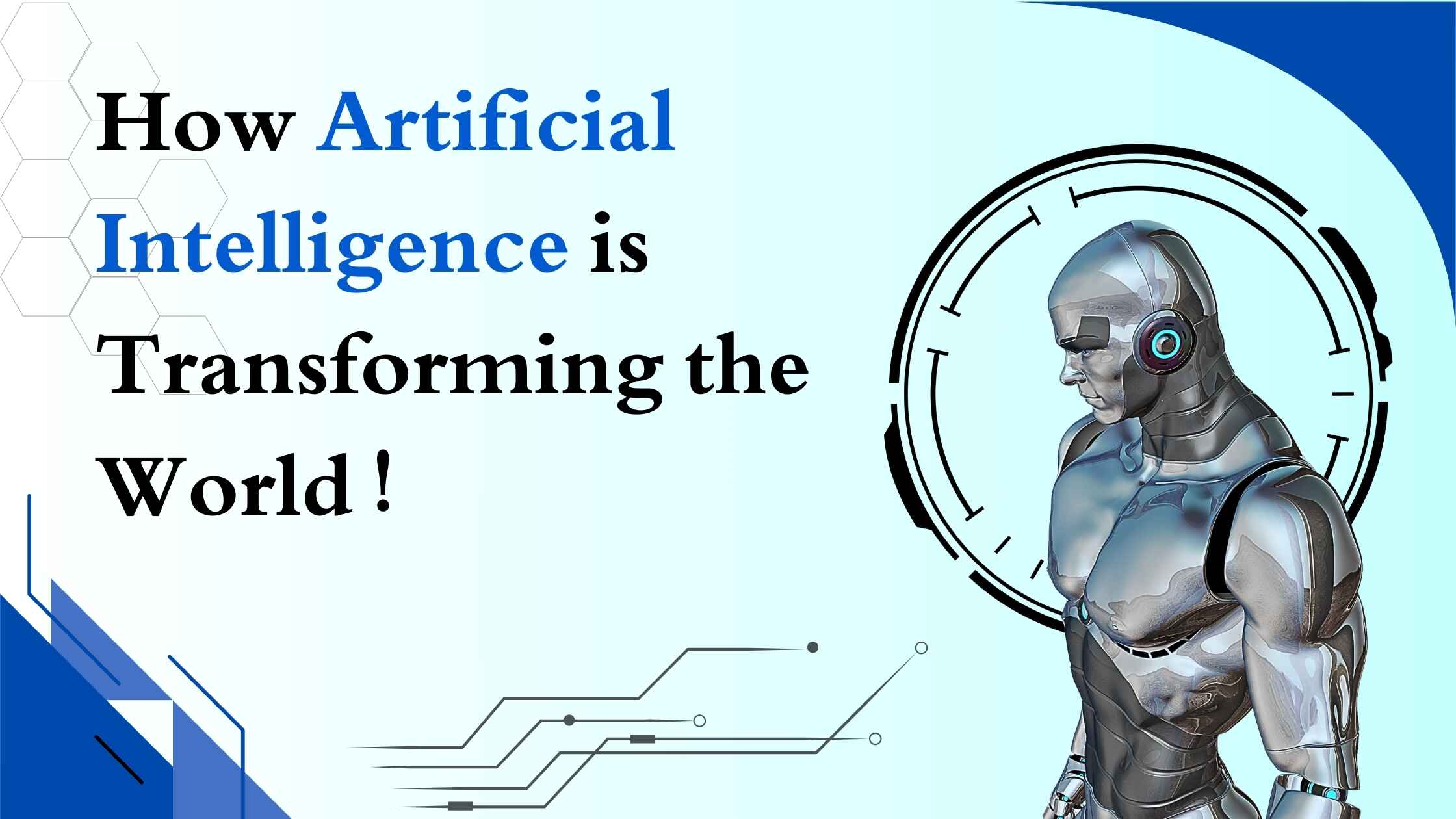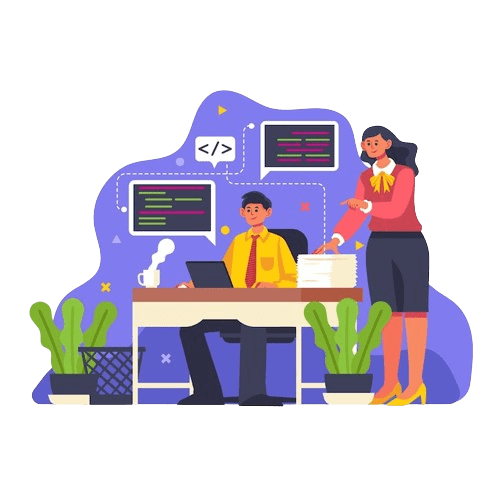How Artificial Intelligence is Transforming the World – Future Of Artificial Intelligence
Future Of Artificial Intelligence (AI) has emerged as one of the maximum transformative technologies of the twenty-first century, revolutionizing numerous elements of our lives. The future of artificial intelligence holds significant promise, as advancements continue to push the limits of what AI can acquire. From healthcare to leisure, finance to transportation, AI is reshaping industries, using innovation, and fundamentally altering the way we stay and artwork.
Introduction to Artificial Intelligence (AI)
At its center, AI refers back to the simulation of human intelligence strategies through machines, particularly laptop structures. This encompasses reading, reasoning, problem-solving, perception, or maybe creativity. The concept of AI dates back to antiquity, but, it wasn’t until the 20th century that massive advancements had been made, leading to the improvement of the contemporary AI era. Today, AI plays a vital position in almost every zone of society, using efficiency, productiveness, and innovation. The non-stop evolution of AI development has propelled improvements across various industries, paving the manner for extraordinary levels of automation, performance, and hassle-solving competencies.
Applications of AI
Artificial Intelligence In Healthcare
AI is revolutionizing healthcare by allowing more correct diagnostics, personalized treatment plans, and efficient medical research. The benefits of artificial intelligence in healthcare are evident as machine learning algorithms analyze good-sized amounts of clinical facts to become aware of patterns and make predictions, leading to advanced affected person effects and decreased prices. By leveraging AI, healthcare professionals can access valuable insights from data, enabling them to deliver more precise diagnoses and tailor treatments to individual patient needs. Additionally, AI-driven research initiatives can accelerate the discovery of new treatments and therapies, ultimately improving patient outcomes and enhancing overall healthcare delivery.
How AI Helps In the Finance Sector
In the economic enterprise, AI is used for fraud detection, algorithmic buying and selling, risk evaluation, and customer support. The future of artificial intelligence in the economic sector holds tremendous promise as AI-powered chatbots and digital assistants offer personalized financial advice and assistance, at the same time as predictive analytics assist businesses make fact-driven selections. As AI continues to evolve, it will increasingly integrate with traditional financial systems, offering new opportunities for automation, efficiency, and innovation. With advancements in machine learning and natural language processing, AI-powered financial services will become more accessible and personalized, catering to the unique needs of each customer.
Future Of AI In Transportation
The transportation region has visible big improvements with the combination of AI. Self-driving cars, powered by means of artificial intelligence software algorithms, promise to make roads more secure and greater green. AI also plays an essential role in optimizing traffic going with the flow, reducing congestion, and enhancing public transportation systems. Through the use of AI-powered sensors and algorithms, transportation networks can dynamically adjust traffic patterns, predict potential bottlenecks, and optimize route planning for vehicles, leading to smoother traffic flow and reduced travel times.
How AI Helps To Improve Education
AI technology is remodeling schooling through personalizing mastering stories, automating administrative duties, and providing get right of entry to to fine schooling assets. Intelligent tutoring systems adapt to college students’ male or woman needs, whilst AI-powered grading equipment streamlines assessment procedures.
How AI Technology Impact In Entertainment Sector
In the enjoyment industry, AI is used for content recommendation, content advent, and target market engagement. Streaming platforms leverage AI algorithms to analyze personal choices and supply personalized tips, while AI-generated content, which includes tunes and paintings, blurs the line between human and gadget creativity.
Integrating AI with Various Technologies
Machine Learning (ML): Machine getting-to-know algorithms permit structures to research from information and enhance over time without being explicitly programmed. By integrating ML with our commercial enterprise solutions, we empower groups to automate approaches, optimize operations, and make facts-pushed choices.
Natural Language Processing (NLP): NLP generation permits computers to recognize, interpret, and generate human language. With NLP integration, groups can automate customer service, analyze client feedback, and extract precious insights from unstructured facts resources consisting of emails, social media, and consumer evaluations.
Computer Vision: Computer vision generation lets in machines to interpret and recognize visible records from pics or films. By integrating PC imaginative and prescient into our answers, we enable organizations to automate visible inspection techniques, enhance safety surveillance, and increase revolutionary augmented reality programs.
Chatbots and Virtual Assistants: Integrating AI-powered chatbots and virtual assistants into commercial enterprise answers allows corporations to offer instant customer service, automate repetitive tasks, and enhance consumer engagement. These smart virtual agents can deal with purchaser inquiries, agenda appointments, and manner orders, and provide personalized tips, enhancing customer pride and decreasing operational prices.
Predictive Analytics: Predictive analytics makes use of AI algorithms to analyze historical information and forecast future trends or outcomes. By integrating predictive analytics into our solutions, we empower agencies to expect client behavior, optimize resource allocation, and mitigate risks proactively.
Internet of Things (IoT): IoT technology connects bodily devices and sensors to the net, enabling data collection and communique among gadgets. By integrating AI with IoT, businesses can leverage real-time statistics insights to optimize tactics, improve performance, and create customized consumer studies.
AI and Automation
The sizable adoption of AI has caused worries approximately activity displacement and automation. While AI has the potential to streamline processes and grow performance, it additionally increases questions about the destiny of labor. Upskilling and reskilling packages are vital to preparing the body of workers for the roles of destiny, and ethical concerns need to be addressed to make certain equitable outcomes for all.
AI and Personalization
One of the maximum sizable influences of artificial intelligence in business is its ability to personalize experiences for users. From targeted advertising and marketing to custom-designed product hints, artificial intelligence algorithms examine person statistics to supply tailored content and offerings. However, this level of personalization raises issues approximately records privacy and the moral use of purchaser records. As companies leverage artificial intelligence in business to enhance customer engagement and drive sales, it is essential to prioritize ethical considerations and ensure transparency in data usage practices. By implementing robust data privacy policies and empowering users with control over their personal information, businesses can build trust and foster positive relationships with their customers.
AI and Creativity
AI’s ability to mimic human creativity is captivating and debatable. From producing art and tune to writing articles and composing poetry, AI algorithms are pushing the boundaries of what machines can reap. However, questions on authorship, originality, and the ethical implications of AI-generated content material remain unresolved.
AI and Decision Making
AI-powered decision-making devices are transforming industries by means of supplying information-driven insights and predictions. From monetary forecasting to threat management, AI algorithms analyze huge quantities of information to inform strategic choices and optimize effects. However, biases in information and algorithms need to be addressed to make certain truthful and obvious choice-making techniques.
AI and Robotics
In the field of robotics, AI is riding improvements in industrial automation, carrier robots, and human-robot interaction. From production to healthcare, robots prepared with AI talents are augmenting human abilties and revolutionizing workflows. However, ethical concerns surrounding process displacement and the ethical remedy of robots must be carefully considered.
AI and Accessibility
AI has the capacity to beautify accessibility for human beings with disabilities via developing assistive technologies and adaptive interfaces. From voice recognition structures to picture recognition software, AI-powered equipment empowers people with disabilities to navigate the world more independently. However, issues approximately equity, privacy, and bias should be addressed to make sure that AI technologies are reachable to all.
AI and the Environment
AI plays an essential position in addressing environmental demanding situations which include climate alternate, pollution, and herbal resource control. Machine studying algorithms analyze environmental information to make predictions, pick out patterns, and make sustainable decision-making. From predicting weather patterns to monitoring wildlife populations, AI technologies are instrumental in protecting the planet for future generations.
Challenges and Risks of AI
Despite its transformative capability, AI also offers several challenges and risks. Bias in algorithms, statistics privacy issues, and the capability for misuse are significant moral concerns. Security vulnerabilities and the capability for process displacement additionally enhance worries about the societal effect of AI. Regulation and governance frameworks are crucial to mitigate those dangers and make certain that AI technologies are evolved and deployed responsibly.
Future Of Artificial Intelligence
Looking ahead, the future of Artificial intelligence guarantees continued improvements and integration with other emerging technologies including blockchain, quantum computing, and augmented fact. As AI becomes greater ubiquitous, its societal implications will become more and more complex, requiring thoughtful consideration and proactive measures to address moral, prison, and social challenges. The future of synthetic intelligence improvement holds great potential for shaping a world where AI contributes undoubtedly to humanity’s progress.
Conclusion
Artificial intelligence is reworking the sector in profound and unheard-of ways, revolutionizing industries, riding innovation, and reshaping the way we live and paint. From healthcare to finance, transportation to education, AI is empowering people and businesses to acquire greater than ever before. However, as we harness the strength of AI, it’s miles essential to method its improvement and deployment with warning, ensuring that it benefits society as a whole while minimizing capability risks and pitfalls. The future of artificial intelligence holds immense promise, offering endless possibilities for innovation and a positive impact on society.




